一般将来时的用法和说明
- 格式:ppt
- 大小:196.50 KB
- 文档页数:17
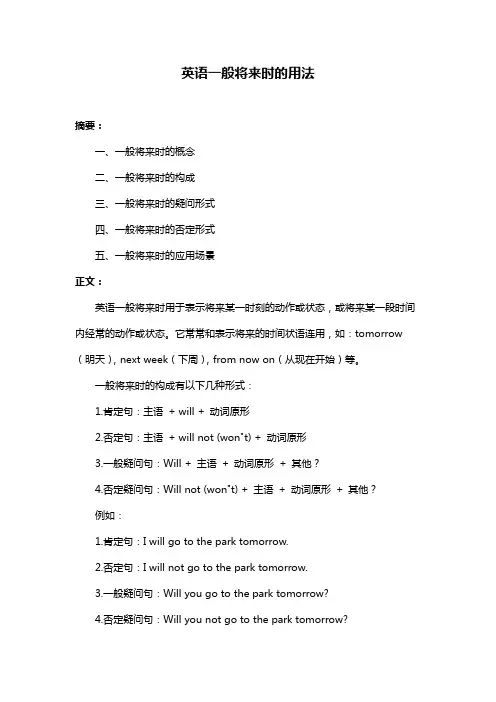
英语一般将来时的用法
摘要:
一、一般将来时的概念
二、一般将来时的构成
三、一般将来时的疑问形式
四、一般将来时的否定形式
五、一般将来时的应用场景
正文:
英语一般将来时用于表示将来某一时刻的动作或状态,或将来某一段时间内经常的动作或状态。
它常常和表示将来的时间状语连用,如:tomorrow (明天),next week(下周),from now on(从现在开始)等。
一般将来时的构成有以下几种形式:
1.肯定句:主语+ will + 动词原形
2.否定句:主语+ will not (won"t) + 动词原形
3.一般疑问句:Will + 主语+ 动词原形+ 其他?
4.否定疑问句:Will not (won"t) + 主语+ 动词原形+ 其他?
例如:
1.肯定句:I will go to the park tomorrow.
2.否定句:I will not go to the park tomorrow.
3.一般疑问句:Will you go to the park tomorrow?
4.否定疑问句:Will you not go to the park tomorrow?
一般将来时在实际应用中非常广泛,可以用于描述未来的计划、预期、愿望等。
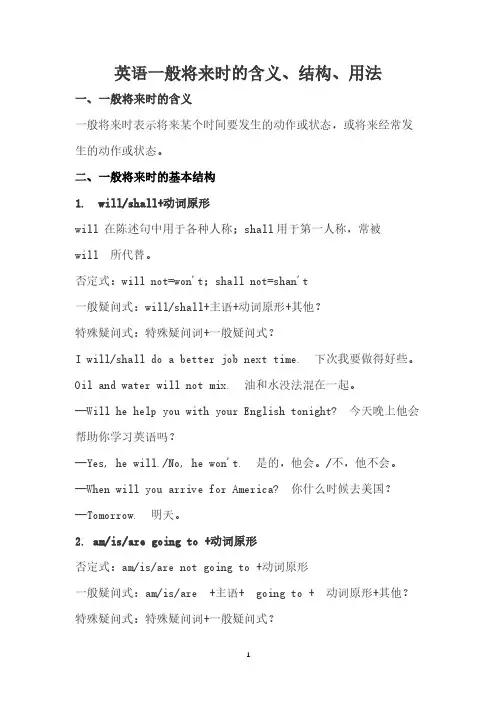
英语一般将来时的含义、结构、用法一、一般将来时的含义一般将来时表示将来某个时间要发生的动作或状态,或将来经常发生的动作或状态。
二、一般将来时的基本结构1. will/shall+动词原形will 在陈述句中用于各种人称;shall用于第一人称,常被will 所代替。
否定式:will not=won't;shall not=shan't一般疑问式:will/shall+主语+动词原形+其他?特殊疑问式:特殊疑问词+一般疑问式?I will/shall do a better job next time. 下次我要做得好些。
Oil and water will not mix. 油和水没法混在一起。
—Will he help you with your English tonight? 今天晚上他会帮助你学习英语吗?—Yes, he will./No, he won't. 是的,他会。
/不,他不会。
—When will you arrive for America? 你什么时候去美国?—Tomorrow. 明天。
2. am/is/are going to +动词原形否定式:am/is/are not going to +动词原形一般疑问式:am/is/are +主语+ going to + 动词原形+其他?特殊疑问式:特殊疑问词+一般疑问式?He is going to spend his holidays in London. 他打算在伦敦度假。
Look at the dark clouds. There is going to be a storm. 看那乌云,快要下雨了。
Is he going to collect any data for us? 他会帮我们收集数据吗?What are you going to do tomorrow? 明天你打算作什么?三、一般将来时的用法will+动词原形与am/is/are going to +动词原形的用法虽然都表示将来发生动作或情况,一般情况下能互换。
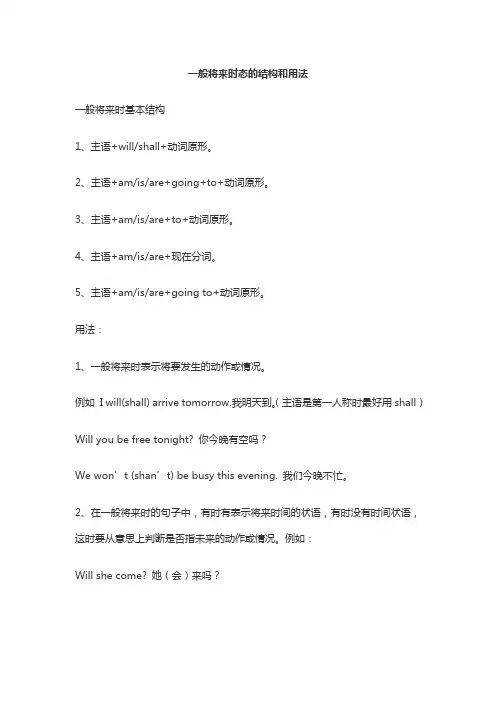
一般将来时态的结构和用法一般将来时基本结构1、主语+will/shall+动词原形。
2、主语+am/is/are+going+to+动词原形。
3、主语+am/is/are+to+动词原形。
4、主语+am/is/are+现在分词。
5、主语+am/is/are+going to+动词原形。
用法:1、一般将来时表示将要发生的动作或情况。
例如:I will(shall) arrive tomorrow.我明天到。
(主语是第一人称时最好用shall)Will you be free tonight? 你今晚有空吗?We won’t (shan’t) be busy this evening. 我们今晚不忙。
2、在一般将来时的句子中,有时有表示将来时间的状语,有时没有时间状语,这时要从意思上判断是否指未来的动作或情况。
例如:Will she come? 她(会)来吗?3、在以第一人称I或we作主语的问句中,一般使用助动词shall,这时或是征求对方的意见,或是询问一个情况(b):a. Where shall we meet? 我们在哪儿碰头?b. Shall we have any classes tomorrow?明天我们有课吗?在这类问句中,近几年来也有不少人用will,特别是在美国。
例如:How will I get there? 我怎么去?扩展资料:一般将来时表示将来某一时段的动作或状态,或将来某一段时间内经常的动作或状态。
在英语时态中,“时“指动作发生的时间,”态“指动作的样子和状态。
一般将来时常常和表示将来的时间状语连用。
如:tomorrow(明天),next week (下周);in the future(将来);in a year(一年以后)等。
一般将来时由助动词shall(第一人称),will(所有人称)动词原形构成。
美式英语则不管什么人称,一律用will。
或用主语+be动词+ going to 动词(be going to)。

一般将来时一般将来时表示将来某一时刻的动作或状态,或将来某一段时间内经常的动作或状态。
常常和表示将来的时间状语连用。
如:tomorrow,the day after tomorrow ,next week(month-),,soon, in the future(将来), in+一段时间(in ten years)等。
一般将来时结构肯定句:主语+am/is/are+going to +do 主语+will / shall+do否定句:am/is/are not +going to +do will / shall + not +do一般疑问句:放于句首; will / shall 提到句首1、will / shall+ 动词原形这种方法一般单纯地表示将来某个时间将要发生的动作或存在的状态。
will用于各种人称;shall只用于第一人称。
例如: I will / shall go to visit him next week. 下周我将去拜访他。
What time shall we go there tomorrow? 明天我们几点去那儿?2、be going to+ 动词原形be going to 相当于一个助动词(其中be有人称和数的变化),与它后面的动词原形一起构成谓语。
a.表示打算、准备做的事。
例如:We are going to put up a building here.我们打算在这里盖一座楼。
How are you going to spend your holidays?假期你准备怎样过?b.表示即将发生或肯定要发生的事。
例如:I think it is going to snow. 我看要下雪了。
There’s going to be a lot of trouble about this. 这事肯定会有很多麻烦一、选择填空:( ) 1. There __________ a meeting tomorrow afternoon.A. will be going toB. will going to beC. is going to beD. will go to be( ) 2. Charlie ________ here next month.A. isn’t workingB. doesn’t workingC. isn’t going to workingD. won’t work( ) 3. He ________ very busy this week, he ________ free next week.A. will be; isB. is; isC. will be; will beD. is; will be( ) 4. There ________ a dolphin show in the zoo tomorrow evening.A. wasB. is going to haveC. will haveD. is going to be( ) 5. –________ you ________ free tomorrow?– No. I ________ free the day after tomorrow.A. Are; going to; willB. Are; going to be; willC. Are; going to; will beD. Are; going to be; will be ( ) 6. Mother ________ me a nice present on my next birthday.A. will givesB. will giveC. givesD. give( ) 7. – Shall I buy a cup of tea for you?–________. (不,不要。
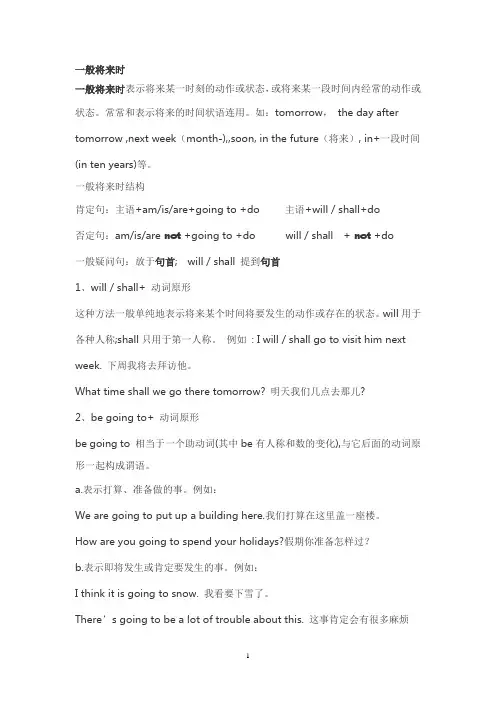
一般将来时一般将来时表示将来某一时刻的动作或状态,或将来某一段时间内经常的动作或状态。
常常和表示将来的时间状语连用。
如:tomorrow,the day after tomorrow ,next week(month-),,soon, in the future(将来), in+一段时间(in ten years)等。
一般将来时结构肯定句:主语+am/is/are+going to +do 主语+will / shall+do否定句:am/is/are not +going to +do will / shall + not +do一般疑问句:放于句首; will / shall 提到句首1、will / shall+ 动词原形这种方法一般单纯地表示将来某个时间将要发生的动作或存在的状态。
will用于各种人称;shall只用于第一人称。
例如: I will / shall go to visit him next week. 下周我将去拜访他。
What time shall we go there tomorrow? 明天我们几点去那儿?2、be going to+ 动词原形be going to 相当于一个助动词(其中be有人称和数的变化),与它后面的动词原形一起构成谓语。
a.表示打算、准备做的事。
例如:We are going to put up a building here.我们打算在这里盖一座楼。
How are you going to spend your holidays?假期你准备怎样过?b.表示即将发生或肯定要发生的事。
例如:I think it is going to snow. 我看要下雪了。
There’s going to be a lot of trouble about this. 这事肯定会有很多麻烦一、选择填空:( ) 1. There __________ a meeting tomorrow afternoon.A. will be going toB. will going to beC. is going to beD. will go to be( ) 2. Charlie ________ here next month.A. isn’t workingB. doesn’t workingC. isn’t going to workingD. won’t work( ) 3. He ________ very busy this week, he ________ free next week.A. will be; isB. is; isC. will be; will beD. is; will be( ) 4. There ________ a dolphin show in the zoo tomorrow evening.A. wasB. is going to haveC. will haveD. is going to be( ) 5. –________ you ________ free tomorrow?– No. I ________ free the day after tomorrow.A. Are; going to; willB. Are; going to be; willC. Are; going to; will beD. Are; going to be; will be ( ) 6. Mother ________ me a nice present on my next birthday.A. will givesB. will giveC. givesD. give( ) 7. – Shall I buy a cup of tea for you?–________. (不,不要。
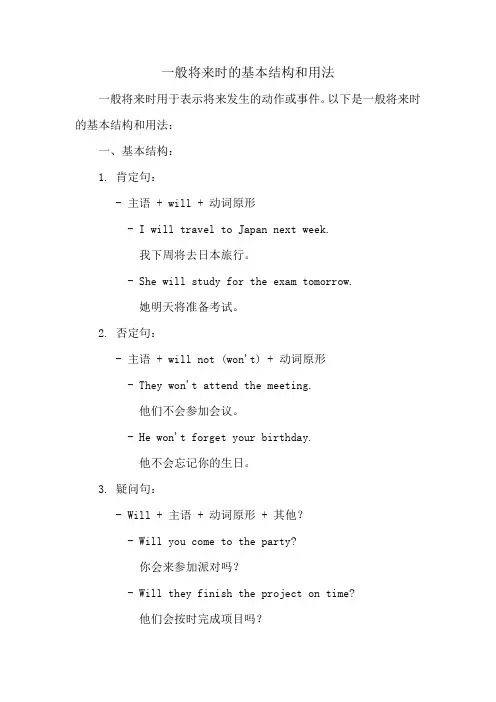
一般将来时的基本结构和用法
一般将来时用于表示将来发生的动作或事件。
以下是一般将来时的基本结构和用法:
一、基本结构:
1. 肯定句:
- 主语 + will + 动词原形
- I will travel to Japan next week.
我下周将去日本旅行。
- She will study for the exam tomorrow.
她明天将准备考试。
2. 否定句:
- 主语 + will not (won't) + 动词原形
- They won't attend the meeting.
他们不会参加会议。
- He won't forget your birthday.
他不会忘记你的生日。
3. 疑问句:
- Will + 主语 + 动词原形 + 其他?
- Will you come to the party?
你会来参加派对吗?
- Will they finish the project on time?
他们会按时完成项目吗?
二、用法:
- 表示将来发生的动作或事件。
- 表示预测、承诺、意图、计划等将来的行为或状态。
- 通常与表示将来时间的时间状语连用,如 tomorrow, next week, in the future 等。
值得注意的是,一般将来时通常用于与将来相关的动作和事件,而对于已经计划或安排好的未来事件,可以使用 "be going to" 结构。
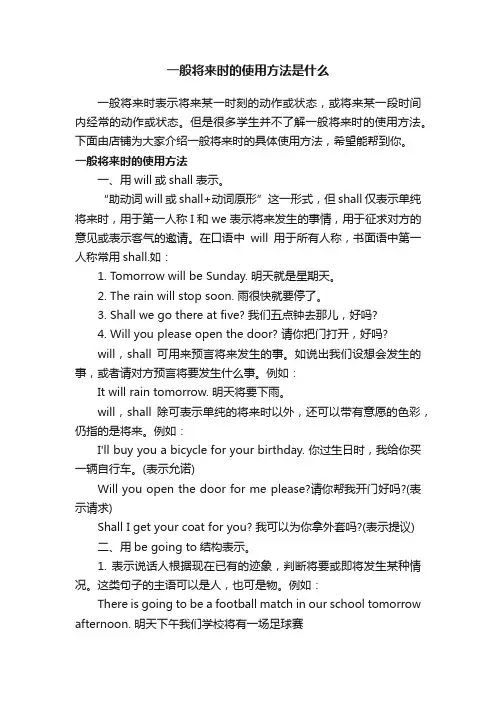
一般将来时的使用方法是什么一般将来时表示将来某一时刻的动作或状态,或将来某一段时间内经常的动作或状态。
但是很多学生并不了解一般将来时的使用方法。
下面由店铺为大家介绍一般将来时的具体使用方法,希望能帮到你。
一般将来时的使用方法一、用will或shall表示。
“助动词will或shall+动词原形”这一形式,但shall 仅表示单纯将来时,用于第一人称I和we表示将来发生的事情,用于征求对方的意见或表示客气的邀请。
在口语中will用于所有人称,书面语中第一人称常用shall.如:1. Tomorrow will be Sunday. 明天就是星期天。
2. The rain will stop soon. 雨很快就要停了。
3. Shall we go there at five? 我们五点钟去那儿,好吗?4. Will you please open the door? 请你把门打开,好吗?will,shall可用来预言将来发生的事。
如说出我们设想会发生的事,或者请对方预言将要发生什么事。
例如:It will rain tomorrow. 明天将要下雨。
will,shall除可表示单纯的将来时以外,还可以带有意愿的色彩,仍指的是将来。
例如:I'll buy you a bicycle for your birthday. 你过生日时,我给你买一辆自行车。
(表示允诺)Will you open the door for me please?请你帮我开门好吗?(表示请求)Shall I get your coat for you? 我可以为你拿外套吗?(表示提议)二、用be going to结构表示。
1. 表示说话人根据现在已有的迹象,判断将要或即将发生某种情况。
这类句子的主语可以是人,也可是物。
例如:There is going to be a football match in our school tomorrow afternoon. 明天下午我们学校将有一场足球赛(已有告示)I feel terrible.I think I'm going to die. 我感到难受极了,我想我快不行了。
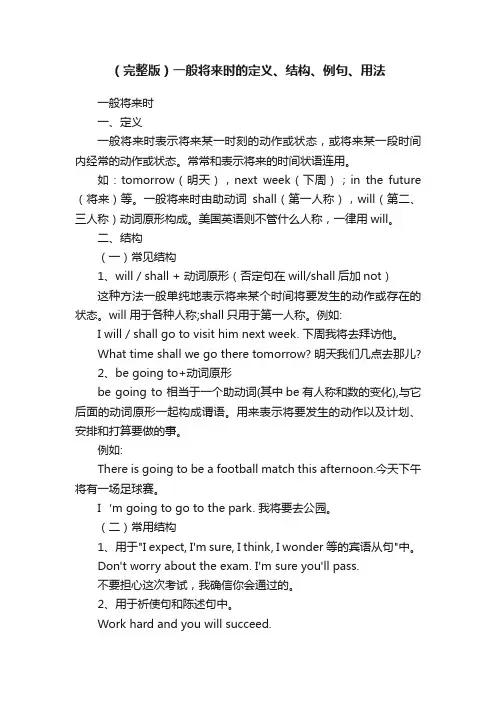
(完整版)一般将来时的定义、结构、例句、用法一般将来时一、定义一般将来时表示将来某一时刻的动作或状态,或将来某一段时间内经常的动作或状态。
常常和表示将来的时间状语连用。
如:tomorrow(明天),next week(下周);in the future (将来)等。
一般将来时由助动词shall(第一人称),will(第二、三人称)动词原形构成。
美国英语则不管什么人称,一律用will。
二、结构(一)常见结构1、will / shall + 动词原形(否定句在will/shall后加not)这种方法一般单纯地表示将来某个时间将要发生的动作或存在的状态。
will用于各种人称;shall只用于第一人称。
例如:I will / shall go to visit him next week. 下周我将去拜访他。
What time shall we go there tomorrow? 明天我们几点去那儿?2、be going to+动词原形be going to 相当于一个助动词(其中be有人称和数的变化),与它后面的动词原形一起构成谓语。
用来表示将要发生的动作以及计划、安排和打算要做的事。
例如:There is going to be a football match this afternoon.今天下午将有一场足球赛。
I‘m going to go to the park. 我将要去公园。
(二)常用结构1、用于"I expect, I'm sure, I think, I wonder等的宾语从句"中。
Don't worry about the exam. I'm sure you'll pass.不要担心这次考试,我确信你会通过的。
2、用于祈使句和陈述句中。
Work hard and you will succeed.如果你努力,就会成功的。
3、与表示时间或条件的状语从句连用。
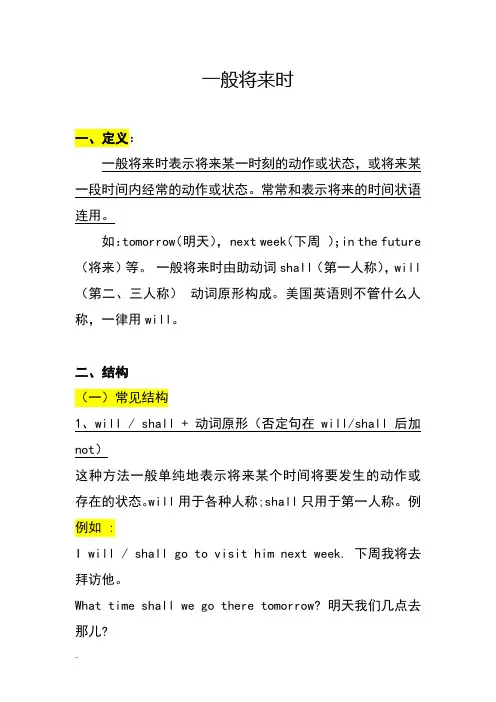
一般将来时一、定义:一般将来时表示将来某一时刻的动作或状态,或将来某一段时间内经常的动作或状态。
常常和表示将来的时间状语连用。
如:tomorrow(明天), next week(下周);in the future (将来)等。
一般将来时由助动词shall(第一人称),will (第二、三人称)动词原形构成。
美国英语则不管什么人称,一律用will。
二、结构(一)常见结构1、will / shall + 动词原形(否定句在will/shall后加not)这种方法一般单纯地表示将来某个时间将要发生的动作或存在的状态。
will用于各种人称;shall只用于第一人称。
例例如 :I will / shall go to visit him next week. 下周我将去拜访他。
What time shall we go there tomorrow? 明天我们几点去那儿?2、be going to+动词原形be going to 相当于一个助动词(其中be有人称和数的变化),与它后面的动词原形一起构成谓语。
用来表示将要发生的动作以及计划、安排和打算要做的事。
例如:There is going to be a football match this afternoon.今天下午将有一场足球赛。
I‘m going to go to the park. 我将要去公园。
(二)常用结构1、用于"I expect, I'm sure, I think, I wonder等的宾语从句"中。
Don't worry about the exam. I'm sure you'll pass.不要担心这次考试,我确信你会通过的。
2、用于祈使句和陈述句中。
Work hard and you will succeed.如果你努力,就会成功的。
3、与表示时间或条件的状语从句连用。
I'll let you know as soon as he arrives.他一到我就通知你。
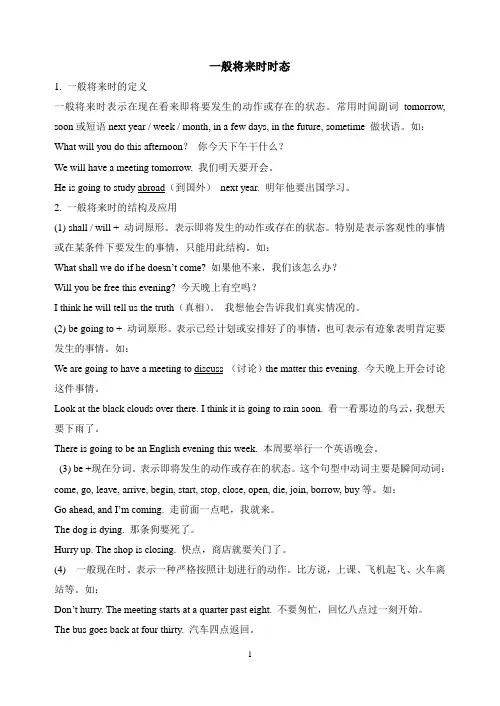
一般将来时时态1. 一般将来时的定义一般将来时表示在现在看来即将要发生的动作或存在的状态。
常用时间副词tomorrow, soon或短语next year / week / month, in a few days, in the future, sometime 做状语。
如:What will you do this afternoon?你今天下午干什么?We will have a meeting tomorrow. 我们明天要开会。
He is going to study abroad(到国外)next year. 明年他要出国学习。
2. 一般将来时的结构及应用(1) shall / will + 动词原形。
表示即将发生的动作或存在的状态。
特别是表示客观性的事情或在某条件下要发生的事情,只能用此结构。
如:What shall we do if he doesn’t come? 如果他不来,我们该怎么办?Will you be free this evening? 今天晚上有空吗?I think he will tell us the truth(真相)。
我想他会告诉我们真实情况的。
(2) be going to + 动词原形。
表示已经计划或安排好了的事情,也可表示有迹象表明肯定要发生的事情。
如:We are going to have a meeting to discuss (讨论)the matter this evening. 今天晚上开会讨论这件事情。
Look at the black clouds over there. I think it is going to rain soon. 看一看那边的乌云,我想天要下雨了。
There is going to be an English evening this week. 本周要举行一个英语晚会。
(3) be +现在分词。
表示即将发生的动作或存在的状态。
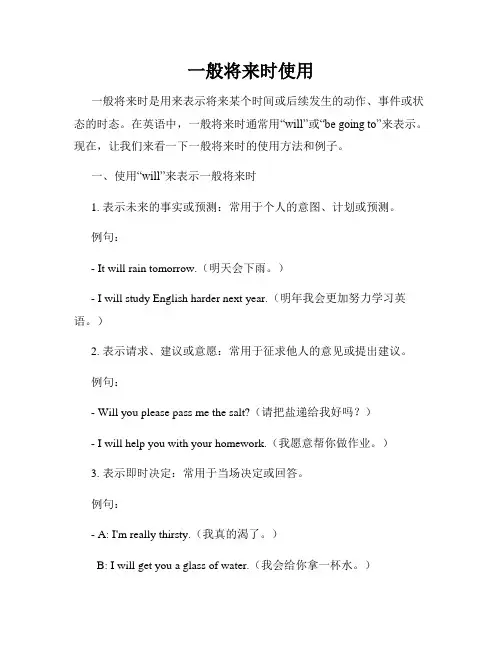
一般将来时使用一般将来时是用来表示将来某个时间或后续发生的动作、事件或状态的时态。
在英语中,一般将来时通常用“will”或“be going to”来表示。
现在,让我们来看一下一般将来时的使用方法和例子。
一、使用“will”来表示一般将来时1. 表示未来的事实或预测:常用于个人的意图、计划或预测。
例句:- It will rain tomorrow.(明天会下雨。
)- I will study English harder next year.(明年我会更加努力学习英语。
)2. 表示请求、建议或意愿:常用于征求他人的意见或提出建议。
例句:- Will you please pass me the salt?(请把盐递给我好吗?)- I will help you with your homework.(我愿意帮你做作业。
)3. 表示即时决定:常用于当场决定或回答。
例句:- A: I'm really thirsty.(我真的渴了。
)B: I will get you a glass of water.(我会给你拿一杯水。
)4. 表示意愿、承诺或威胁:常用于表示个人的意愿、承诺或威胁。
例句:- I will never forgive you for what you've done.(我永远不会原谅你所做的事情。
)- I will always love you.(我将会一直爱你。
)二、使用“be going to”来表示一般将来时1. 表示计划、决定或意图:常用于提到已经计划、决定或打算要做的事情。
例句:- I am going to have dinner with my friends tonight.(今晚我打算和朋友一起吃晚饭。
)- They are going to visit their grandparents next weekend.(他们下个周末打算拜访他们的祖父母。
一般将来时用法和注意一、语法:一般将来时表示的是将来某个时间要发生的动作或存在的状态。
二、谓语构成:will+动词原形,也可以用be going to+动词原形来表示。
在表示即将发生某事时,be going to与will可以互换,意义不变。
既be going to=will.三.例句:1,We are going to have a big test next week.(肯定句)=We will have a big test next week.2,We are not going to have a big test next week.(否定句)=We will not have a big test next week.3,Are you going to have a big test next week?(疑问句)=Will you have a big test next week?4,What are you going to do next week?(特殊问句)=What will you do next week?四.注意的地方:1.报刊等正式文体中多用will(shall).例:a.President Wen will leave for America next month.b.What’s going to happen next year?(What will happen2.第一人称也就是I,we还可用shall.e.ga.I shall/will go to another middle school next term.=I am going to another middle school next term.b.We shall get three“A”next month.=We will got three“A”next month.=We are going to get three“A”next month.3.单纯表示将来的客观情况,常用will/shall+动词原形结构,有时有“意愿”的意思。
一般将来时用法描述一般将来时(Simple Future Tense)用于描述将来发生的动作、事件或状况。
以下是一般将来时的用法描述:1. 表示将来计划或安排的动作:- I will go to the store tomorrow.(我明天会去商店。
)- We will have a meeting next Monday.(我们下周一会开会。
)2. 表示将来预测的动作或事件:- It will rain tomorrow.(明天会下雨。
)- They will win the game.(他们会赢得比赛。
)3. 使用“be going to + 动词”的形式表示打算、计划或决定将要发生的动作:- He is going to study abroad.(他打算出国留学。
)- She is going to buy a new car.(她计划买一辆新车。
)4. 使用“be about to + 动词”的形式表示即将发生的动作:- The movie is about to start.(电影即将开始。
)- The train is about to leave.(火车即将离开。
)5. 使用“will + 动词”的形式表示意愿、意图或请求:- I will help you with your homework.(我会帮你做作业。
)- Will you please pass me the salt?(请你把盐递给我好吗?)需要注意的是,在某些情况下,一般将来时还可以表示现在的决心、意愿或习惯:- Every morning, I will exercise for 30 minutes.(每天早晨,我都会锻炼30分钟。
)- I will never give up.(我永不放弃。
)。
一般将来时一、基本内容1.构成:“助动词will+ 动词原形”2。
含义及用法:一般将来时表示将来某个时间将要发生的动作或存在的状态,也表示将来经常或反复发生的动作。
3。
时间状语:一般将来时常与表示将来的时间状语连用,如:tomorrow, next week,next year, in the future等。
Eg: They will visit Shanghai next week。
People will have robots in their homes in the future.二、句型转化1、肯定句:“主语+will +动词原形+其他。
” Eg: They will have a test next week。
2、否定句:在will 后加 not ,即“主语+won't +动词原形+其他.”Eg: She will be an engineer.(改为否定句)She won’t be an engineer。
3、一般疑问句:将will提到主语前面,即“Will+ 主语+动词原形+其他?"回答时使用yes/no。
Eg: He will live in New York in 10 years. (改为一般疑问句并作肯定回答)Will he live in New York in 10 years? Yes, he will.三、注意事项1、Will 常表示客观的将来,也可表示“带意愿色彩的将来”,也可表示“委婉客气的邀请或命令”Eg: He will be 18 years olds next month.下个月他将满18岁。
I will tell you all about it. 我愿意把所有与此相关的事都告诉你。
Will you please close the door? 请你把门关上好吗?2、在疑问句中,主语为第一人称(I 和we)时,常用助动词shall。
一般将来时的结构和用法总结
一般将来时的结构和用法总结
一般将来时是表示将要发生的动作或存在的状态,它是由助动词will,shall,be going to 和一般现在时的句子组成的。
一、结构
1. will + 动词原形:
例如:I will go.
2. shall + 动词原形:
例如:We shall study.
3. be going to + 动词原形:
例如:He is going to work.
二、用法
1. will + 动词原形
(1)表示将要发生的动作或存在的状态。
例如:He will come here tomorrow.
(2)用于一般疑问句和否定句中表示请求、命令和建议。
例如:Will you please open the door?
2. shall + 动词原形
(1)表示说话人的意图或决定,多用于第一人称。
例如:I shall be there on time.
(2)用于疑问句表示请求或建议,多用于第一人称。
例如:Shall I open the window?
3. be going to + 动词原形
(1)表示主观上的打算,意图或决定。
例如:I am going to go to Japan next month.
(2)表示看来将要发生的动作或存在的状态。
一般将来时的定义与用法
一般将来时是用来表达将来发生的动作、事件或状态的时态。
它经常使用will 或be going to来构成。
will的使用:
1. 表示意愿或承诺:
I will help you with your homework later.(我稍后会帮你做作业。
)
Mike will bring me the book tomorrow.(迈克明天会把书带给我。
)
2. 表达预测
I think it will snow later.(我觉得外面会下雪。
)
They will arrive at the airport at 10 a.m.(他们会在上午10点到达机场。
)
be going to的使用:
1. 表达计划或打算
I am going to see a movie tonight.(我今晚要去看电影。
)
They are going to travel in Europe next month.(他们下个月要去欧洲旅游。
)2. 表达预测
Look at those dark clouds. It's going to rain.(看那些乌云,马上就要下雨了。
)
注意:一般将来时也可以使用现在进行时或简单现在时来表达将来的计划或安排,如:
I am seeing a movie tonight.(我今晚要去看电影。
)
They leave for Europe next month.(他们下个月去欧洲旅游。
)
此时,我们还需要结合语境来理解句子含义。